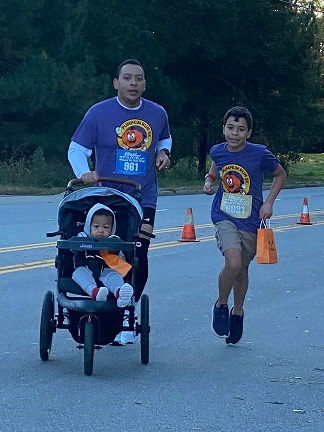
Lieutenant James Reap swore he was done with running after completing patrol school to become a South Carolina state trooper in 2011.
“If you see me running, something’s chasing me,” he used to joke. “I ran in patrol school only because I had to.”
Growing up, Reap said, working out and physical fitness were not priorities for him, even after becoming a law enforcement officer.
“It’s something I let slide for many, many years until I finally decided to get back into it,” he said. “I guess it was just my age that kept me feeling physically fit.”
For eight years, he patrolled the roadways of York County in Troop 4 before accepting a position in the Department of Public Safety’s Office of Professional Responsibility, which oversees internal affairs investigations.
But things took a drastic turn in 2020. Reap had watched his father’s health diminish in recent years from diabetes and lung disease. When his father contracted Covid-19 in September 2020, the virus and his other ailments proved too much for his lungs, which eventually shut down.
“He knew what was happening, and he was ready to go,” Reap recalled. “He was like, ‘Don’t cry for me. I’m ready.’”
While grieving his father, Reap had a grim realization about his own mortality and declining health since his own diabetes diagnosis five years prior.
“That was scary. I wasn’t doing anything healthy for myself at the time,” said Reap, a husband and father of three. “It still took me two years to do something about it after he passed.”
Reap had started running earlier in 2020, mostly out of boredom due to pandemic closures.
“I ran for about six to eight months there, and I got physically healthy,” he said. “Once everything opened back up, I quit. My weight went back up, and my diabetes got out of control.”
When Reap decided to start running again in late 2022, he had gained more than 40 pounds from when he finished patrol school in 2011 and was on medication for diabetes, high blood pressure, and sleep apnea. With Reap taking five pills daily just to manage his diabetes, and his doctor threatening to put him on daily insulin injections, physical fitness was no longer a choice. He had to start running again — his life depended on it.
“I didn’t want to wait until New Year’s to make a resolution,” he said. “So I started in late December 2022, just jogging.”
Reap’s early days of running started out small, at first running a couple hundred yards and then walking. But he kept putting one foot in front of the other, remembering he had a wife and children who needed him. Before long, he was running 2 miles around his neighborhood.
“It took three or four weeks before I could sustain a mile at a very slow pace, and it built up from there,” he said.
One of Reap’s fellow OPR investigators, Captain John Boehm, started running 5K and 10K road races in November 2022. He coached and encouraged Reap, especially during the early days of his fitness journey. By March 2023, Reap had signed up for his first 5K race.
Reap took a major step in his fitness journey by running his first half marathon — barely a month after running his first-ever road race. And just a few months after running his first half-marathon, he took another huge step by registering for a full, 26.2-mile marathon. The 2024 Myrtle Beach Marathon was in early March, giving Reap several months to train.
Reap followed a training plan he found online, which prescribes running three days a week, with the mileage increasing each week.
“The farthest I ran before the marathon was 19 miles,” he said. “But all of the training plans I looked at said that if you can run 18 miles, then you can run 26.”
Reap recalled the doubts that lingered in his mind as he walked to the starting line on that cold, rainy morning.
“I got to a point where I thought that, physically, I wouldn’t be able to make it,” he said. “Especially at about mile 16. You’re just pounding the pavement, over and over again.”
Grueling mile after mile, he knew quitting wasn’t an option and proudly crossed that finish line.
Since beginning his journey nearly two years ago, Reap has put hundreds of miles and a few more races under his belt, with races planned out through the end of 2025. Today, he is down 37 pounds and no longer needs to take the pills for diabetes, high blood pressure, and high cholesterol. And Boehm, who first motivated Reap to run a 10K, even found inspiration from his colleague to run his first marathon.
The real crowning achievement for Reap is that his 11-year-old son is following his example, and recently ran his first 5K.
“Without me even pushing it, he asked me one day to run a race,” Reap said. “Now that’s all he wants to do. Every time I sign up for one, he asks if I signed him up too.”
Reap chuckled thinking about how his son picked up this newfound passion. But behind that chuckle is a sense of relief and optimism.
“You can exercise all you want and eat as well as you can, but your diabetes is genetic and you’re not going to make that go away,” he recalled his doctor telling him. “Luckily my son is 11 and he has no health issues now, but I didn’t get my diagnosis until I was 30. So if he starts his health journey now, maybe he can beat some of those things later.”



